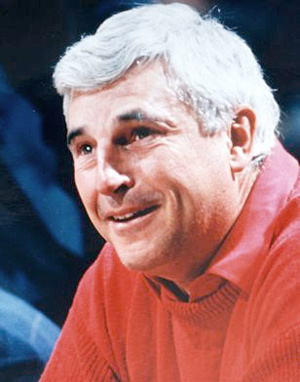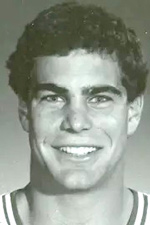1987 NCAA champion player talks about Coach Bob Knight
By STU CLAMPITT
news@readthereporter.com
Joe Hillman didn’t just play for Bob Knight, he was part of the 1987 NCAA championship team. In the wake of Knight’s passing, The Reporter offers readers some insights on the man known as “the General” from one of the players who was part of the season everyone remembers.
“There is a huge misconception about what everybody hears and what they think they know,” Hillman told The Reporter. “Yes, he was very demanding of the team. I’ve always said it took a unique individual to play for Bob Knight. If you didn’t like it, that was okay, you left. But that wasn’t Bob Knight’s fault. That’s the way he was, and he wasn’t going to change it for you.”

Coach Bob Knight
1940 – 2023
Hillman said Coach Knight made the game easier for his players by breaking down details from game films to help them predict what the opposition would do and by drilling his motion offense.
“On the defensive end, we knew what their team was going to do the majority of the time, which made that easier for us,” Hillman said. “With the motion offense, once you learn it, there was really no way of stopping us from getting shots unless we were sloppy with our cuts and screens. You didn’t have to be the most athletic, you didn’t have to be the best player, because we could get shots and we could get to the free throw line. We were hard to guard.”
Hillman said 1987 was no different than any other year, other than Knight pushing a little harder and demanding higher standards because he knew that could be their year.
“I think he thought we were going to be really good,” Hillman said. “But there was never – in that season – really any relaxation whatsoever. It was, ‘okay, so we won this game. It doesn’t matter if we just beat Michigan, now we got to go beat Illinois.’ It was interesting that in the 1987 season I don’t think we played a whole lot of our best basketball in the tournament, but we just found a way. We were determined enough and found a way to win.”
Hillman said playing for Knight was not all about scoring. It was about stopping your guys, rebounding, being mentally tough, and overcoming adversity.
“The ’87 team did that better than any team I’ve ever been associated with,” Hillman said. “Bob Knight won games. People might say, ‘well, he did this or he did that.’ No, no, no – he won games. One of the things that really bothers me still is when people say, ‘oh, he was verbally abusive to the players; he wasn’t fair to the players.’ He wasn’t like that. Bob Knight was as fair as you could possibly be because if you played well in practice, you played in games. There was no set starting five.”
Hillman said when his team got beat, there were changes made. Knight’s theory was, “We didn’t win with those guys. I’m going to give other guys a chance.”
Knight wanted to build teams that were hard to play against.
“If somebody goes out and upsets the number one ranked team in the country, they’re probably going to lose the next night because they’re all patting themselves on the back and telling each other how great they are,” Hillman said. “There was never a big win in Indiana. Never. Winning was what you were expected to do. Every loss was like it was the end of the world.”

Hillman, now

Hillman, then
Hillman stayed in touch with Knight long after graduation. Hillman called Knight “a great needler” who not only liked to poke fun, but who liked it when guys came back with something clever so he could just laugh.
“If I needed something, you know, all I’d do is call my head coach,” Hillman said. “And he’d say, ‘Ah, Jesus, you only call me when you need something. What do you need?’ But he would always do it though. He would just call me sometimes and say, ‘Hey, Hillman, how’s things going? You doing all right?’ Once in a while I’d go, ‘What do you need?’ He’d laugh and say, ‘I don’t need anything from you. If I needed something tonight, I wouldn’t call you.’ He had a great sense of humor. That was stuff people didn’t get to see.”
In the days since Knight’s passing, a lot of the focus has been on moments he barked at refs and the time he threw a chair, but those rare moments seem to have become the norm for coaches now.
“Coach Knight sat in a chair to watch 90 percent of the time,” Hillman said. “Now all these coaches just run up and down the sideline. Coach Knight sat in the chair and watched because his job was done. He had prepared us. We had readiness for the game.”
Hillman said he is bothered by ESPN and other media outlets running highlights of Knight yelling at a ref or yelling at some kid.
“How about him giving Quinn Buckner and Scott May a hug?” Hillman said. “Or Isaiah and Wittman and Kitchel – those guys hugging – or hugging Alford at the end of game? That’s what Coach Knight was all about.”
Hillman wants Knight to be remembered as one of the greatest basketball minds.
“You know why you don’t see motion offense today?” Hillman asked. “Because there’s not a coach who knows how to teach it. And that’s sad because that’s the way basketball is meant to be played – not on ball, pick and roll. The reason why that’s all you see now in the NBA too is because that’s easy to coach. ‘Hey, I’m going to have three guys go stand. I’m going to take my best ball handler and we’re going to pick and roll.’ What do you have to coach there? If you’ve got good players, you’re done.”
Hillman said he also wants Knight to be remembered for his ability to build great teams.
“I want you to remember him as a guy that won games,” Hillman said. “The yelling and the screaming – that gets way overblown. We had a text thread going with about 10 or 12 of us the other night that played on the ‘87 team. Somebody made the point, ‘Man, I’d just like to hear him yell and scream at me one more time.’ I said, ‘Heck yeah! That’d be great.’”
Hillman told The Reporter he has no regrets about his time on Knight’s team.
“The guy was a great coach, and his record speaks for itself,” Hillman said. “When people ask me about what it was like to play for Bob Knight, I said, ‘You know what? If I had to do it all over again, I’d do it again without any reservations at all.”

